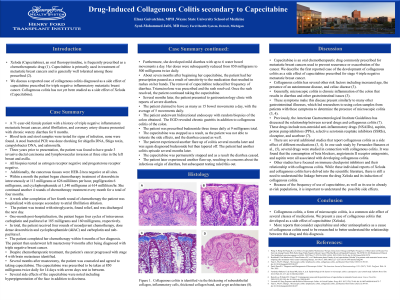Monday Poster Session
Category: IBD
P2237 - Drug-Induced Collagenous Colitis Secondary to Capecitabine
Monday, October 23, 2023
10:30 AM - 4:15 PM PT
Location: Exhibit Hall

Has Audio
- EG
Elnaz Guivatchian, MPH
Wayne State University School of Medicine
Detroit, MI
Presenting Author(s)
Elnaz Guivatchian, MPH1, Syed-Mohammed Jafri, MD2
1Wayne State University School of Medicine, Detroit, MI; 2Henry Ford Health System, Detroit, MI
Introduction: We present a case of collagenous colitis as a side effect of capecitabine for triple-negative (HER-/ER-/PR-) inflammatory metastatic breast cancer.
Case Description/Methods: A 71-year-old female with a history of triple negative inflammatory metastatic breast cancer, atrial fibrillation, and coronary artery disease presents 8 months of watery diarrhea.
Three years ago, the patient was diagnosed with grade 3 invasive ductal carcinoma and lymphovascular invasion and underwent chemotherapy with doxorubicin, pegfilgrastim, and cyclophosphamide. The cancer progressed to stage 4 metastatic disease to the brain.
The patient was prescribed capecitabine. Side effects of the capecitabine were noted including hyperpigmentation of the face and dizziness. The patient developed diarrhea managed with dose reduction and intermittent cessation of capecitabine.
Several months later, the patient presented to the gastroenterology clinic with severe diarrhea, with as many as 15 bowel movements daily. The patient underwent a diagnostic colonoscopy for further evaluation of the diarrhea. Non-bleeding internal hemorrhoids were found, and the colon was biopsied demonstrating collagenous colitis of the colon. The patient was prescribed budesonide. The capecitabine was permanently stopped as a result, and the diarrhea ceased. The patient later experienced another flare-up, resulting in concerns about the infectious origin of diarrhea, but subsequent testing ruled this out.
Discussion: Capecitabine is an oral chemotherapeutic drug prescribed to prevent the recurrence or exacerbation of metastatic breast cancers. We describe the first reported case of the development of collagenous colitis as a potential side effect of capecitabine prescribed for stage 4 metastatic breast cancer.
Collagenous colitis is a subtype of microscopic colitis, characterized by chronic colon inflammation resulting in watery diarrhea with related dehydration and weight loss.
Previously, the American Gastroenterological Institute Guidelines have discussed the relationship between several drugs and collagenous colitis including non-steroidal anti-inflammatory drugs and proton pump inhibitors. Several studies have reported the effect of these medications and collagenous colitis, however, there is no evidence for a causal relationship. While these studies discussed many drugs, from our review of the literature, none have noted capecitabine as a potential causative agent for drug-induced collagenous colitis.
Disclosures:
Elnaz Guivatchian, MPH1, Syed-Mohammed Jafri, MD2. P2237 - Drug-Induced Collagenous Colitis Secondary to Capecitabine, ACG 2023 Annual Scientific Meeting Abstracts. Vancouver, BC, Canada: American College of Gastroenterology.
1Wayne State University School of Medicine, Detroit, MI; 2Henry Ford Health System, Detroit, MI
Introduction: We present a case
Case Description/Methods: A 71-year-old female with a history of triple negative inflammatory metastatic breast cancer, atrial fibrillation, and coronary artery disease presents 8 months of watery diarrhea.
Three years ago, the patient was diagnosed with grade 3 invasive ductal carcinoma and lymphovascular invasion and underwent chemotherapy with doxorubicin, pegfilgrastim, and cyclophosphamide. The cancer progressed to stage 4 metastatic disease to the brain.
The patient was prescribed capecitabine. Side effects of the capecitabine were noted including hyperpigmentation of the face and dizziness. The patient developed diarrhea managed with dose reduction and intermittent cessation of capecitabine.
Several months later, the patient presented to the gastroenterology clinic with severe diarrhea, with as many as 15 bowel movements daily. The patient underwent a diagnostic colonoscopy for further evaluation of the diarrhea. Non-bleeding internal hemorrhoids were found, and the colon was biopsied demonstrating collagenous colitis of the colon. The patient was prescribed budesonide. The capecitabine was permanently stopped as a result, and the diarrhea ceased. The patient later experienced another flare-up, resulting in concerns about the infectious origin of diarrhea, but subsequent testing ruled this out.
Discussion: Capecitabine is an oral chemotherapeutic drug prescribed to prevent the recurrence or exacerbation of metastatic breast cancers. We describe the first reported case of the development of collagenous colitis as a potential side effect of capecitabine prescribed for stage 4 metastatic breast cancer.
Collagenous colitis is a subtype of microscopic colitis, characterized by chronic colon inflammation resulting in watery diarrhea with related dehydration and weight loss.
Previously, the American Gastroenterological Institute Guidelines have discussed the relationship between several drugs and collagenous colitis including non-steroidal anti-inflammatory drugs and proton pump inhibitors. Several studies have reported the effect of these medications and collagenous colitis, however, there is no evidence for a causal relationship. While these studies discussed many drugs, from our review of the literature, none have noted capecitabine as a potential causative agent for drug-induced collagenous colitis.
Disclosures:
Elnaz Guivatchian indicated no relevant financial relationships.
Syed-Mohammed Jafri: Gilead, Takeda, Abbvie – Advisor or Review Panel Member, Speakers Bureau.
Elnaz Guivatchian, MPH1, Syed-Mohammed Jafri, MD2. P2237 - Drug-Induced Collagenous Colitis Secondary to Capecitabine, ACG 2023 Annual Scientific Meeting Abstracts. Vancouver, BC, Canada: American College of Gastroenterology.
